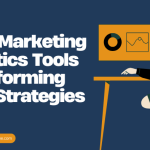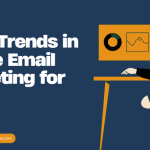Introduction
As we approach 2025, the landscape of data-driven marketing continues to evolve at a breakneck speed. Brands that leverage data effectively are not only enhancing their marketing strategies but also fostering deeper connections with their customers. In this article, we’ll explore the top five trends that are set to shape the future of data-driven marketing, ensuring that your business stays ahead of the curve.
1. Hyper-Personalization
Hyper-personalization takes the concept of personalization to the next level. Instead of merely segmenting audiences based on demographic data, brands are now utilizing advanced data analytics to create highly customized experiences for each consumer.
What Is Hyper-Personalization?
Hyper-personalization involves using real-time data, behavioral insights, and advanced algorithms to tailor marketing messages and offers to individual preferences. This approach helps brands deliver the right message at the right time, significantly improving customer engagement.
Why It Matters
- Increased Customer Loyalty: Customers are more likely to stay loyal to brands that understand their unique needs.
- Higher Conversion Rates: Personalized messages can lead to a dramatic increase in conversion rates, as consumers respond better to offers that resonate with them.
For an in-depth look at personalization trends, check out Top 7 Content Personalization Trends 2024-2025.
Visual Element
| Benefits of Hyper-Personalization | Impact on Marketing Performance |
|---|---|
| Increased Customer Engagement | Up to 50% higher click-through rates |
| Improved Customer Retention | 30% more repeat purchases |
| Enhanced Brand Perception | 20% increase in brand loyalty |
2. AI and Machine Learning Integration
Artificial Intelligence (AI) and machine learning are no longer just buzzwords; they are integral to the future of data-driven marketing. These technologies enable marketers to analyze vast amounts of data quickly and efficiently.
How AI and Machine Learning Are Used
- Customer Insights: AI can analyze consumer behavior patterns to predict future actions, helping marketers make data-backed decisions.
- Automation: Routine tasks can be automated, allowing marketers to focus on strategy rather than administrative work.
The Benefits
- Increased Efficiency: AI can manage and analyze data at a scale and speed that humans cannot match.
- Improved Campaign Performance: By using AI to optimize campaigns in real-time, companies can see significant improvements in ROI.
For insights into AI tools transforming marketing, explore Top 10 AI-Powered Marketing Tools Transforming 2024 Strategies.
3. Predictive Analytics
Predictive analytics utilizes historical data and statistical algorithms to forecast future outcomes. This powerful tool helps marketers make informed decisions based on predictive models.
Importance of Predictive Analytics
- Anticipating Customer Needs: By analyzing past behaviors, brands can anticipate what customers will want in the future.
- Optimizing Marketing Strategies: Predictive analytics helps in identifying the most effective marketing channels and strategies.
Applications in Marketing
- Customer Segmentation: Marketers can identify high-value customers and tailor campaigns accordingly.
- Churn Prediction: Businesses can proactively address potential customer churn by identifying at-risk customers.
For a more comprehensive look at predictive analytics, visit Top 7 Predictive Analytics Trends to Watch in 2024.
4. Real-Time Data Processing
In an age where instant gratification is the norm, real-time data processing has become essential for effective marketing. Brands can now react to customer behaviors as they happen.
Benefits of Real-Time Data Processing
- Immediate Response: Marketers can engage with customers in real-time, enhancing the user experience.
- Data-Driven Decisions: Real-time insights allow for immediate adjustments to campaigns based on performance metrics.
Case Studies
- E-commerce: Retailers can offer time-sensitive discounts to customers who are browsing specific products.
- Social Media: Brands can monitor social media trends and engage with audiences dynamically.
For insights on real-time data strategies, refer to Top 7 Data-Driven Marketing Trends 2024.
5. Ethical Data Usage
As data collection becomes increasingly sophisticated, ethical data usage has emerged as a critical issue in marketing. Consumers are more aware of how their data is used, and brands must prioritize transparency and trust.
The Importance of Ethical Data Practices
- Building Trust: Companies that are transparent about their data practices foster greater trust among consumers.
- Compliance: With regulations like GDPR and CCPA, ethical data usage is not just a best practice but a legal requirement.
Best Practices for Ethical Data Usage
- Transparency: Clearly communicate what data you collect and how it will be used.
- Consent: Always obtain explicit consent from users before collecting their data.
To learn more about ethical data practices, check out Top 7 Data Privacy Trends Shaping Marketing 2024.
Conclusion
As we look ahead to 2025, the future of data-driven marketing is bright and full of possibilities. By embracing hyper-personalization, integrating AI and machine learning, utilizing predictive analytics, processing data in real-time, and committing to ethical data usage, businesses can position themselves for success in a rapidly changing landscape.
Staying informed about these trends will not only enhance your marketing strategies but also cultivate stronger relationships with your customers.
FAQs
Q1: What is data-driven marketing?
Data-driven marketing is a strategy that uses customer data to inform and optimize marketing campaigns, allowing brands to make decisions based on insights rather than intuition.
Q2: How can my business start implementing these trends?
Begin by investing in data analytics tools and training your team on how to interpret data. Focus on collecting quality data and using it to inform your marketing strategies.
Q3: What are the risks of not adopting data-driven marketing?
Failing to adopt data-driven marketing can lead to missed opportunities, inefficient use of marketing budgets, and a disconnect between the brand and its customers.
Q4: Is there a cost associated with implementing these trends?
Yes, there may be initial costs for tools and training, but the long-term ROI from better-targeted campaigns typically outweighs these expenses.
By staying ahead of these trends, you can ensure that your marketing strategies remain relevant and effective in an increasingly data-driven world. Happy marketing!




